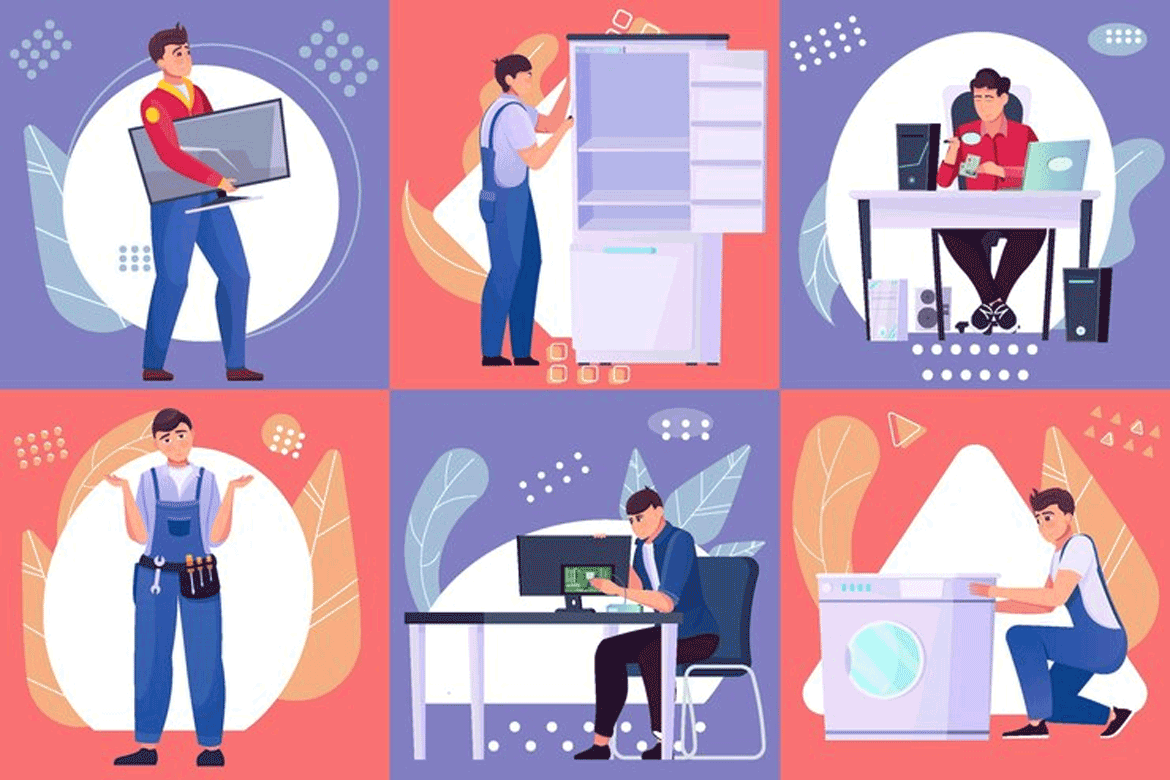Professional Tips for Maintaining and Cleaning Your Appliances
- Appliances are big household expenses and investments that should last for many years with proper care and maintenance.
- Refrigerators and dishwashers function behind the scenes, while ovens and small appliances are utilised every day.
- However, without regular maintenance, even the greatest quality brands can decay far sooner than their specified lifespan.
- This guide’s basic professional suggestions can help you maximise the efficiency and operation of all of your appliances while also saving money. First, regular cleaning might help to avoid costly problems.
- Early troubleshooting allows minor issues to be resolved before they cause significant damage. Appliances can last significantly longer if they receive regular preventative maintenance.
Clean appliances on a regular basis.
- Cleaning your appliances on a regular basis helps to keep things working smoothly over time. The frequency with which you clean the equipment is determined by its use.
- Refrigerators require a thorough cleaning around once a month. Unplug it, remove all shelves and racks, and then clean the walls and shelves with a light detergent solution. Dry it fully to avoid getting zapped by water near electrical components!
- To avoid baked-on messes, clean down oven and microwave interiors after every few usage once they have cooled.
- Allow a damp cloth or paper towel to soak in household cleaning or white vinegar before washing any stubborn messes. Click here to learn how to clean your oven properly.
- After each usage, wipe down the range tops to keep burnt food from solidifying. Special cleansers are effective, as is white vinegar and water. However, avoid strong scouring; gentler methods are preferable for coatings.
- Front-loading washers are prone to mildew. To eradicate odours at their source, keep the rubber seal propped open between loads and clean down with disinfectant spray once a month.
- Regular cleaning keeps things working properly for the long haul. Check online or in manuals for any manufacturer-specific suggestions.
Check for Wear and Tear.
- Taking the time every few months to thoroughly inspect each appliance for signs of wear and tear is equally vital as regular cleaning. Catching minor flaws before they worsen can help you prevent severe and costly repairs later.
- Begin by inspecting door seals and gaskets that keep cold air in refrigerators and freezers. Look for cracks, bubbles, or regions that are no longer tightly sealed. Worn sealings allow airflow, which raises energy consumption.
- Gaskets are normally updated every 5-10 years under regular use. Inspect the washer and dryer drums as well as the liners. Thinning, rips, or cracks impair efficiency and may require annual replacement.
- Examine the shelves, baskets, trays, and other removable components. Look for cracks or warping that could cause damage or allow food and dirt to fall through.
- Grease filters for ovens and range hoods are consumable products that typically last 3-6 months with frequent cleaning. Making sure that moving parts on doors and drawers work smoothly is also essential for trouble-free operation.
- Performing frequent inspections helps detect minor fixable flaws before they mark the end of your appliance’s useful life.
- With proper care and maintenance, most home and kitchen equipment can last between 10 and 15 years. Replacing parts as needed improves functioning and saves money.
Troubleshoot issues early.
- Being proactive about maintenance might help identify minor appliance faults before they become major concerns.
- Being proactive about maintenance might help identify minor appliance faults before they become major concerns. It’s a good idea to run simple checks every few months.
- With refrigerators, ensure sure the doors are completely sealed so that the inside remains cool.
- Run through both the hot and cold dispensers. Pause the washer and dryer in the middle of the cycle to listen for unusual sounds or vibrations. When cooking, make sure the burners and oven are heating up evenly.
- Be on the alert for red signals like as temperature changes, lengthier cook times, or strange odours. This could indicate that something is not working properly internally. Do not ignore performance drops—most repairs are less expensive the sooner you detect minor issues.
- For error codes, consult manuals or contact website/customer support for DIY solutions. Filter cleaning, for example, is frequently used to resolve minor issues.
- Understand when it is appropriate to call a professional, such as for warranted part replacements or intricate jobs. Staying proactive is far less expensive than playing catch-up with appliance troubles.
Final Words
- Taking the time each month to meticulously clean, examine, organise, and troubleshoot appliances using these professional recommendations will dramatically improve their lifespan and help avoid costly repairs in the future.
- Regular maintenance is a rather straightforward procedure. Being proactive in caring for appliances ensures that they continue to work reliably and efficiently to complete household duties.
- With proper care and maintenance, big appliances may serve a home and family’s needs for many years.
READ MORE ARTICLES:
Roof Design: Usability and Sustainability
